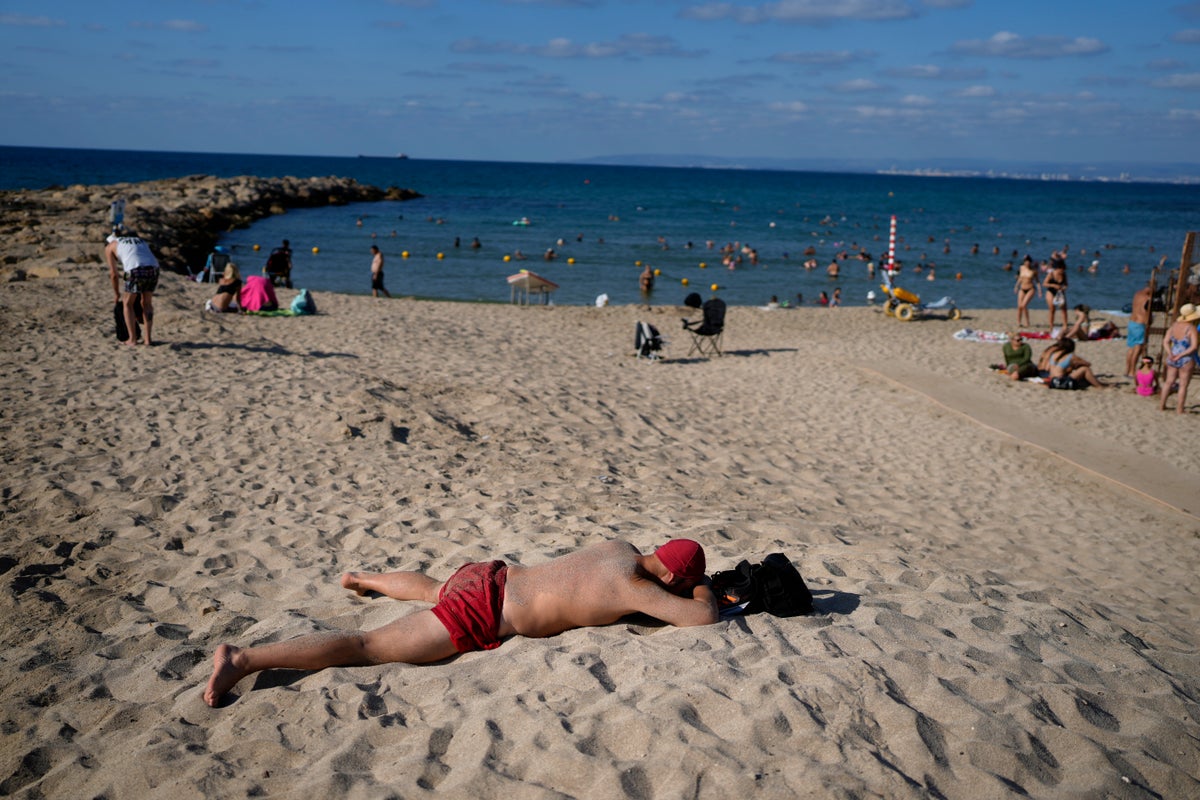
Support truly
independent journalism
In Beirut, shops are open and traffic is as snarled as ever. In Tel Aviv, cafes hum with patrons and umbrellas sprout across crowded beaches.
Such scenes may seem surreal in a region teetering on the edge of all-out war — and beneath the surface there is plenty of fear and anxiety. But after 10 months of near-daily border skirmishes, strikes further afield and escalating threats, a sense of fatalism seems to have set in.
The killings last week of two militant leaders in Beirut and Tehran — attributed to Israel — brought vows of revenge from Iran and Lebanon's Hezbollah. Everyone expects that an all-out war would be far more devastating than any previous conflict between Israel and Hezbollah, including the 2006 war.
But in Nahariya, a coastal Israeli town just 6 kilometers (3.7 miles) south of Lebanon, Israelis lounged at the beach and surfers caught waves in the shadow of the hills rolling along the border.
Nahariya resident Shauli Jan said the area was “tense” but that most people were still going about their daily lives despite frequent air raid sirens. He decided to come to the beach as usual.
“We just want it to be calm," he said. “We prefer to have a political arrangement and not war.”
In Beirut, about 110 kilometers (70 miles) to the north, the streets were bustling even in Dahiyeh, a neighborhood that houses many of Hezbollah’s political and security operations and where an Israeli airstrike killed Hezbollah commander Fouad Shukur and six other people last week.
The area, which is also a densely populated residential and commercial district, was devastated during the 2006 war; Israel has warned it would be flattened in the next one.
Some residents said they were moving to other parts of Beirut, while others vowed to stay.
“I will not leave Dahiyeh, no matter what happens," said Khalil Nassar, 75, who was carrying Lebanese, Palestinian and Hezbollah flags in a show of solidarity as he went about his day. “They are trying to intimidate us.”
Even those who fear the worst may feel there's little to be done. Authorities on both sides have yet to issue any orders to evacuate or prepare, even as several countries have put out dire travel warnings and many airlines have suspended service.
Israel's military had not as of Monday released any special guidelines or warnings for civilians, meaning beaches were full, summer camps were ongoing and people still headed to work as they have throughout most of the war in Gaza. No one seemed to be stocking up on supplies and grocery shelves were full.
For many, the worrisome anticipation was tempered by the obligation, for now, to carry on.
“There is no change to the Home Front Command’s defensive policy,” the military's chief spokesperson Rear Adm. Daniel Hagari told Israelis in a nationally televised address on Sunday. “At the same time, we are in strong readiness for defense in the air, at sea, and on land, and we are preparing for any sudden threat.”
After an apparent Israeli strike on an Iranian consular building in Syria killed two Iranian generals in April, Iran responded with an unprecedented direct attack on Israel, launching some 300 ballistic missiles and drones, nearly all intercepted by a coalition of international forces.
Elad Karta, who works in real estate, said his response to the latest Iranian threat was to come to the beach in Tel Aviv with his wife and son.
“It’s summer break, so we’re doing it for him,” he said.
He and his wife had discussed buying extra cooking gas or emergency lighting but in the end decided against it.
“We don’t feel scared, but we do feel kind of unsure of what will happen next,” he said.
In Lebanon, Hezbollah legislator Amin Sherri told The Associated Press the government has an emergency plan in case of all-out war, and the country has enough fuel and medicine to last between two and four months. On Monday, caretaker Health Minister Firass Abiad received 32 tons of medical equipment and medicine from the World Health Organization.
Sherri said there was great uncertainty over Israel’s next moves.
“We don’t know when it will initiate its aggression,” he said.
Several countries, including the United States, Britain, France and Canada have warned their citizens to exercise caution or leave the region. Many airlines have canceled flights to Lebanon and Israel, causing crowding as travelers try to rebook. Some of the expatriates who came to Lebanon to spend the summer have cut their trips short.
At Beirut’s Rafik Hariri International Airport, some international flights were canceled while others delayed their flights, leaving passengers packed at the departure terminal. Passengers who spent hours waiting were sleeping on the ground waiting for the next flight.
Roy Steinmetz, spokesperson for the Israel Airports Authority, said the airline cancellations were expected to have an immediate effect, with tens of thousands fewer passengers set to pass through the country's main international airport compared to the same time last year.
In the Beirut neighborhood of Dahiyeh, streets were filled with shoppers even around the building targeted by the Israel airstrike last Tuesday. Hezbollah has vowed to respond in kind without specifying when or how.
Nearby, 54-year-old Saad Baydoun surveyed the damage to his shops, which sell internet and sound systems. His apartment was also damaged in the airstrike, forcing his wife and children to move in with relatives in another part of Beirut.
“Israel wants war but we don’t, there is no doubt about that,” said Baydoun. “What I felt is 1% of what the people of Gaza are passing through."
Near Tel Aviv's central Dizengoff Square, boutiques and ice cream shops welcomed patrons as Israelis walked their dogs or meandered.
“We’re just holding on, waiting to see the size of the attack,” said Tim Pshshinski, 21, who said he recently completed his compulsory Israeli military service.
“Life must continue, and there’s not much else we can do.”







